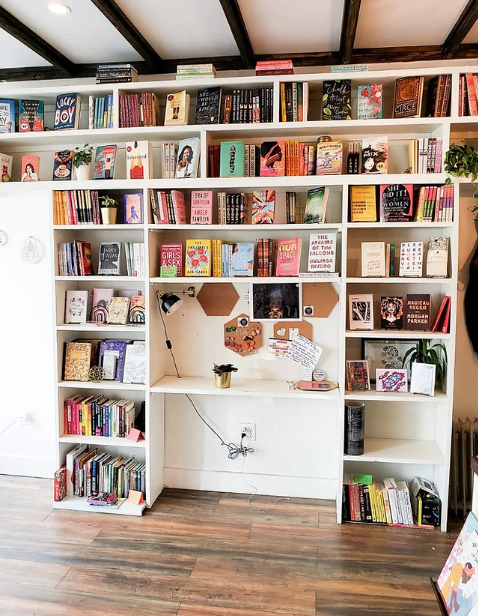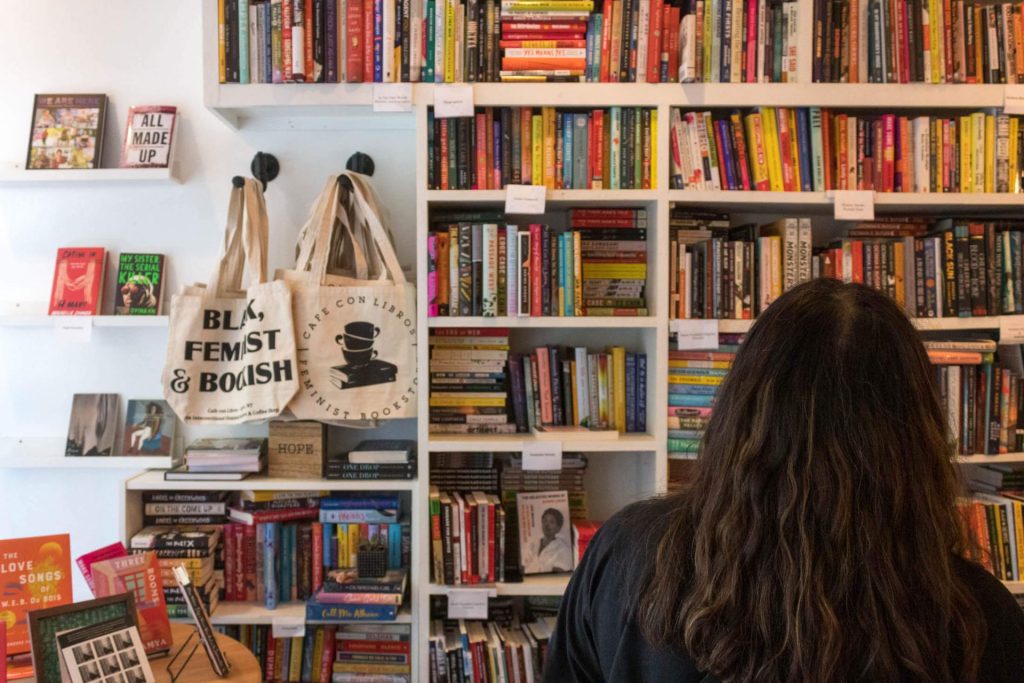Beyond the Bookshelves: How Space in Cafe con Libros Tells a Story
When you walk into the door of Café con Libros in Crown Heights, Brooklyn, one word immediately comes to mind: small. The store itself cannot hold more than five or ten people comfortably, despite the majority of the space being left open. There aren’t tables and chairs to sit in simply for space-saving purposes, and the books themselves take up nearly the entirety of the walls to either side of you as you walk into the store. At a glance, the shelves cannot hold more than 500 books, despite being packed full to the point where some of the longer shelves are bowing in the middle. The “sections” are indicated by small paper labels on the outside edge of the shelves, and there must be a dozen labels spanning the length of the wall-to-wall, floor-to-ceiling shelf along the left wall that holds the majority of books in the store.
The irony of a lack of shelves in a bookstore is not lost here. The lack of space seems to have forced DeSuze’s interior design hand here, yet there is more of a method to her madness. The large front-facing windows in the store accompanied by the bright overhead lighting bring a sense of openness and lightness to the space. The bright white bookshelves don’t hurt either. DeSuze was clear about her commitment to diversity in books, but she was also clear about her commitment to fostering a community of intersectional feminists in Crown Heights. Before the COVID-19 pandemic, this little shop held book club meetings, author signings, and many other events that pushed its capacity to the limit. Communities need all the space they can get, hence the lack of bookshelves filling every nook and cranny in the store.
Kalima DeSuze, the owner of Café con Libros, made it clear when she opened the store that its goal was to empower and uplift the voices of intersectional (specifically Afro-Latina) authors. This mammoth of a shelf shows just how committed she is to that vision. There are sections for Black biographies, Black novels, Queer stories, African diaspora, and many more. It seems as if DeSuze is attempting to encompass the world in her shelves. There can’t be more than two or three of the same books on the shelves, unlike the standardized Barnes & Noble style stocking we see so often. Instead, DeSuze has favored variety over quantity, cramming her shelves full of every story from the African and Latinx diaspora she can get her hands on, and then some.
“There were times when I couldn’t answer questions about my own identity and I would read, and it would give me more insight into who I am and put my experience in a global context; it’s not just about me. So I decided I wanted a feminist bookstore.”
Kalima DeSuze, Medium
The lack of clear, large signs indicating sections also tells a story of community and inclusivity. DeSuze doesn’t hide her commitment to intersectional stories, and what screams intersectionality more than books with no sections? Black biographies are next to Latinx novels, and without a close look, the average customer cannot see any borders between the sections. The identities these novels represent are less separate than we may believe, and Café con Libros’ shelves show that idea in their organization.
In Lydia Pyne’s novel Bookshelf, she breaks down the implications of a bookshelf and its organization beautifully. Pyne states that “any system of organizing books creates an order and an expectation…how books are catalogued, shelved, and displayed shows a certain worldview and particular system of thinking” (33). Pyne argues that bookshelf placement and organization send a message from the owner of the shelves and books to the consumer of the books. DeSuze is clearly sending a message here, intentionally or not: all stories are intertwined, and identities have no strict boundaries like a section in a bookstore does.
The section labels, along with parts of this imposing shelf, appear to have changed over time through necessity. The shelves featured a small desk in the middle that no longer exists, replaced by more shelves to hold more books, and the books are crammed in tighter now, instead of arranged in neat little displays like in the past. The shelves and their organization changed as necessity asked more of the store: more books, more variety of stories, and more organization in the shelf itself.

Pyne touches on this aspect of the shelf as well in her novel, stating that “ways of storing books…are shaped by the necessity of circumstance” (72). While Pyne is referring to bookshelves during a time of book banning, the principle applies to DeSuze her bookshelf in Café con Libros. Necessity brought about changes to the store and how its shelves interact with the books and the customer. This necessity comes mostly from the desire to compose a more comprehensive collection. DeSuze finds more books by Latinx and Black women, adds a couple to the shelf, and suddenly there are too many to be contained by the few shelves available. The desk disappears, replaced by the Queer romance section followed by four other sections below it. Two tables appear on either side of the entrance featuring more popular Black literature, and the shelves begin to sag under the weight of the Latinx and African diaspora on paper.

Café con Libros is advertised as an intersectional feminist bookstore, which begs the question of how representative or comprehensive their book collection can be. At first glance, it seems this store is in danger of creating “the illusion of adequate representation of a world,” as James Clifford discusses in “On Collecting Art and Culture” (218). Yet DeSuze never claims that these books represent the world, or even the entirety of a small piece of the world. Another major point Clifford makes regarding collections is how collections will often cut “objects out of specific contexts (whether cultural, historical, or intersubjective) and making them ‘stand for’ abstract wholes” (220). DeSuze’s book collection in Café con Libros does the opposite of this. The books she stocks are the source of context for multiple cultures and experiences.
Café con Libros also looks at culture and intersectionality as a source of community wealth for others. By connecting with individuals who have similar experiences we can form stronger bonds with our identities, and what better way to encounter someone just like you than through a book? Clifford sees this as a more negative aspect of collecting, noting that “the notion that this gathering involves the accumulation of possessions, the idea that identity is a kind of wealth,” referring to the thought that obtaining objects from cultures was a form of displaying status or wealth (218). Yet the collection in Café con Libros speaks to a different version of wealth: cultural wealth. The range of experiences contained in the singular shelf lining the left wall does not try to represent the whole world, but instead provide context and knowledge to its consumers that museum collections do not.
While small, the content of that singular shelf in Café con Libros packs a punch, covering the experiences of women across the globe. And what the bookstore lacks in stock it makes up for in open space and brightness, as well as community connections. The fewer shelves there are, the more room there is for socialization and community events in the walls of this tiny beacon of feminism and diversity in Crown Heights, Brooklyn. I for one, cannot wait to see Café con Libros packed to the brim with people for events once again.
Works Cited:
Research/Information
Pyne, Lydia. Bookshelf. New York, Bloomsbury Publishing Inc. 2016.
Clifford, James. “On Collecting Art and Culture.” The Predicament of Culture: Twentieth-Century Ethnography, Literature, and Art, Harvard College, 1988, pp. 215-251.
Kobert, Rebecca. “Badass Women: Kalima DeSuze, founder of feminist bookstore, Café con Libros.” Medium, 28 Jun. 2018. https://medium.com/coconuts/badass-women-kalima-desuze-founder-of-feminist-bookstore-cafe-con-libros-c64e0f8ed358.
Images
Bookshelf inside Cafe con Libros. “Intersectional Feminist Bookstore: Cafe Con Libros: New York.” Cafe Con Libros, www.cafeconlibrosbk.com/
De Vries, Susan. Bookshelf in Café con Libros. “Get ready to Snap Up Some Books With the Return of the Brooklyn Bookstore Crawl” by Susan De Vries, 13 April 2022, Brownstoner, https://www.brownstoner.com/brooklyn-life/brooklyn-bookstore-crawl-2022-greenlight-cafe-con-libros-freebird-books-are-magic/

0 Comments